Bangladeshi authorities say refugees who fled Myanmar are adding to the soaring drug problem inside the country. But the Rohingya Muslims living in the refugee camps told R&K their new hosts have left them with no choice.
On a balmy evening last November, Sahara Khatun boarded the bus from a refugee camp to the port city of Cox’s Bazar. It was the seventh trip she had taken that afternoon, and she hoped it would be her last.
Khatun—short, with jet-black hair—wore a light green hijab and small gold piercing in her nose. In her arms, she carried her one-year-old son. As she made her way to the back of the coach, the recycled air hit her like hot breath. She was tired, her baby was restless, and the plastic packet she had concealed under her tunic felt clammy against her skin.
Khatun had done this many times before. In fact, she has been doing it for the last two years and has never been caught. But the experience didn’t lessen the nerves; it didn’t dull her awareness of what was at stake. She says she had no choice.
Khatun, a Rohingya who had fled to Bangladesh during a mass exodus in the early 90s, is among hundreds of refugees who work as mules for Bangladeshi and Burmese drug suppliers. For 10,000 taka ($120) she carries packets of yaba—blood red methamphetamine pills from Myanmar—and passes through a number of police checkpoints on the road to Cox’s Bazar, some 20 miles away.
Khatun agreed to speak to Roads & Kingdoms on condition that she be identified by a pseudonym because she feared she would face reprisals from drug gangs or police. She says she meets her Bangladeshi supplier at the same place all the time, in a clearing in the forest near her house in the Kutupalong camp, a government-run refugee camp in Ukhia, 270 miles from Dhaka. There, he hands her a large package and tells her he will meet her in the city later that day, to pick up the pills.
Khatun knows the risks. But she has five children to feed, and there is no one else to care for them.
Since the latest refugee crisis began in August last year, a new band of Rohingya, like Khatun, have joined the trade, smuggling yaba across the Myanmar border and onward to major Bangladeshi cities every day. The smuggling has increased in concert with rising consumption of yaba in the country. According to the Bangladesh Police, seizures of yaba pills have risen more than 2,500 percent in the last seven years, and government officials believe that suppliers are taking advantage of the Rohingya crisis. In the sprawling refugee camps near Cox’s Bazar, where the refugees live in temporary shacks and have few opportunities to find work, the yaba trade has found a natural home.
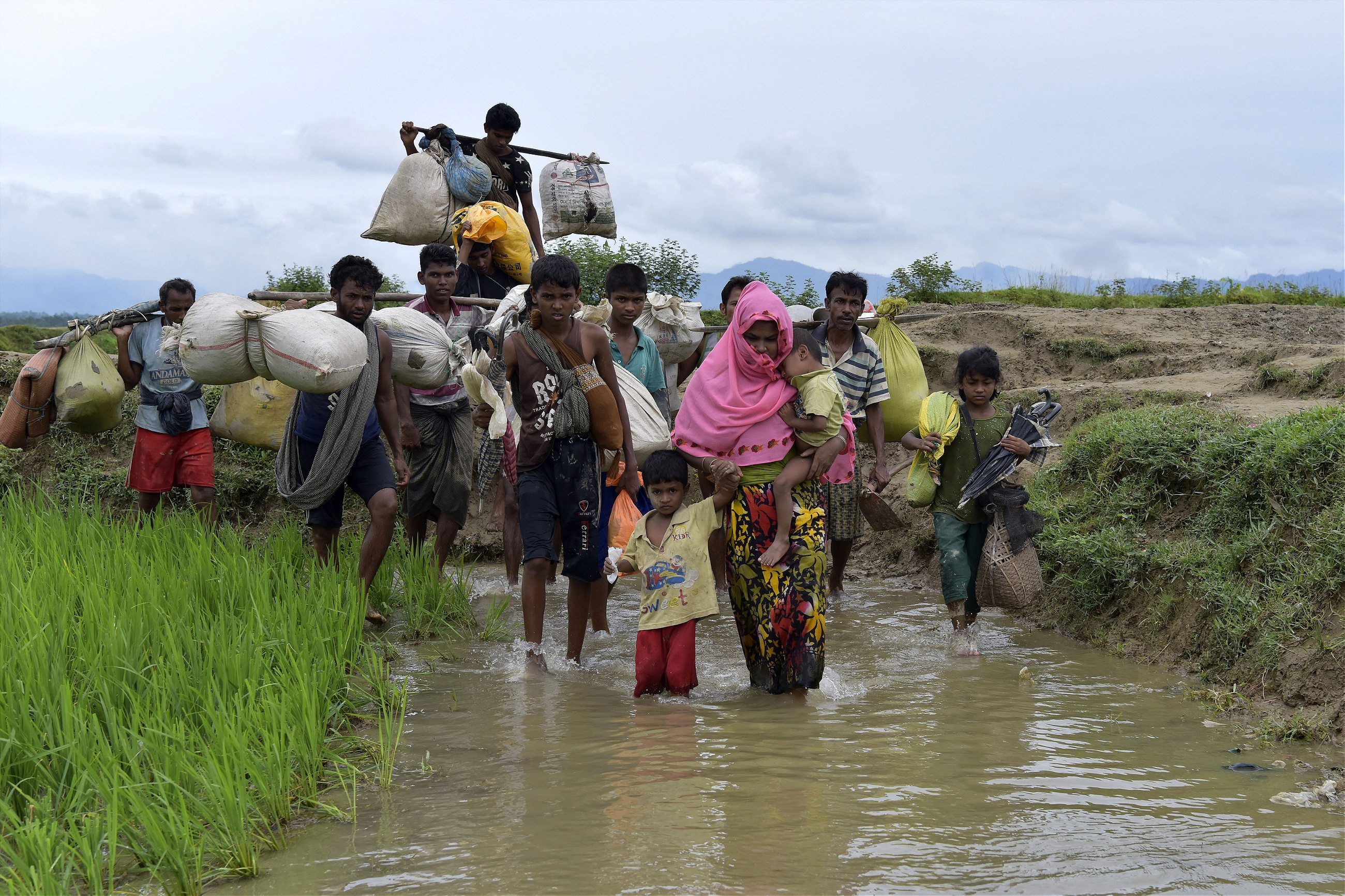
Since the beginning of a new wave of government-led violence in Myanmar last summer, more than 680,000 Rohingya have fled their homes in the western Rakhine state and made the perilous journey into neighboring Bangladesh. International rights organizations have accused the Burmese government of burning down houses and fear ever broader abuses against the Rohingya, a Muslim minority group that has long faced persecution in their homeland.
Among other libels the Burmese state has perpetuated about the Rohingya, they pushed the story that because Muslim men were able to take more than one wife, the Rohingya would reproduce faster than the majority Buddhists and would eventually convert Myanmar into an Islamic state. Fearing reprisals after the torture and killing of their relatives, hundreds of thousands of Rohingya people began fleeing to Bangladesh.
[Related: This is what it’s like to be a Rohingya]
Today, Khatun is joined by newer Rohingya refugees who fled after fresh violence in Rakhine last year. Kadiza Begum, 18, is among those who arrived in Bangladesh last year. And like Khatun, she too has worked as a drug mule.
Begum also asked Roads & Kingdoms to identify her by her pseudonym because she feared she’d be arrested and deported by Bangladeshi authorities. Inside her home in the Kutupalong camp, she sits cross-legged on a red rug in the corner of her shack. She is wearing a niqab, her brown eyes peering out from behind the black veil. Nervous that her neighbors could be listening in, she mumbles throughout our conversation—and refuses to utter the word “yaba.”
Begum has been collecting yaba packages twice a month for less than a year. She says she was paid $60 a trip and only worked with other Rohingya. She would receive the drugs from recently arrived refugees and then transport them back into the camps. Begum tells me she always used a van to go back and forth from the border area. To avoid getting caught, she would ask the driver to stop at least 200 meters from every military and police checkpoint. She would then get out of the van and take a circuitous route through the forest, rejoining the vehicle again only when it had past the checkpoint further down the road.
Like Khatun, she is a mother, but unlike Khatun, whose husband had died two years ago, Begum’s husband also works in the business. Begum said the couple started dealing and transporting yaba in Myanmar and had continued their illegal work in Bangladesh. He lives in a different part of the camp: the pair prefers to live separately to reduce their chances of being caught.
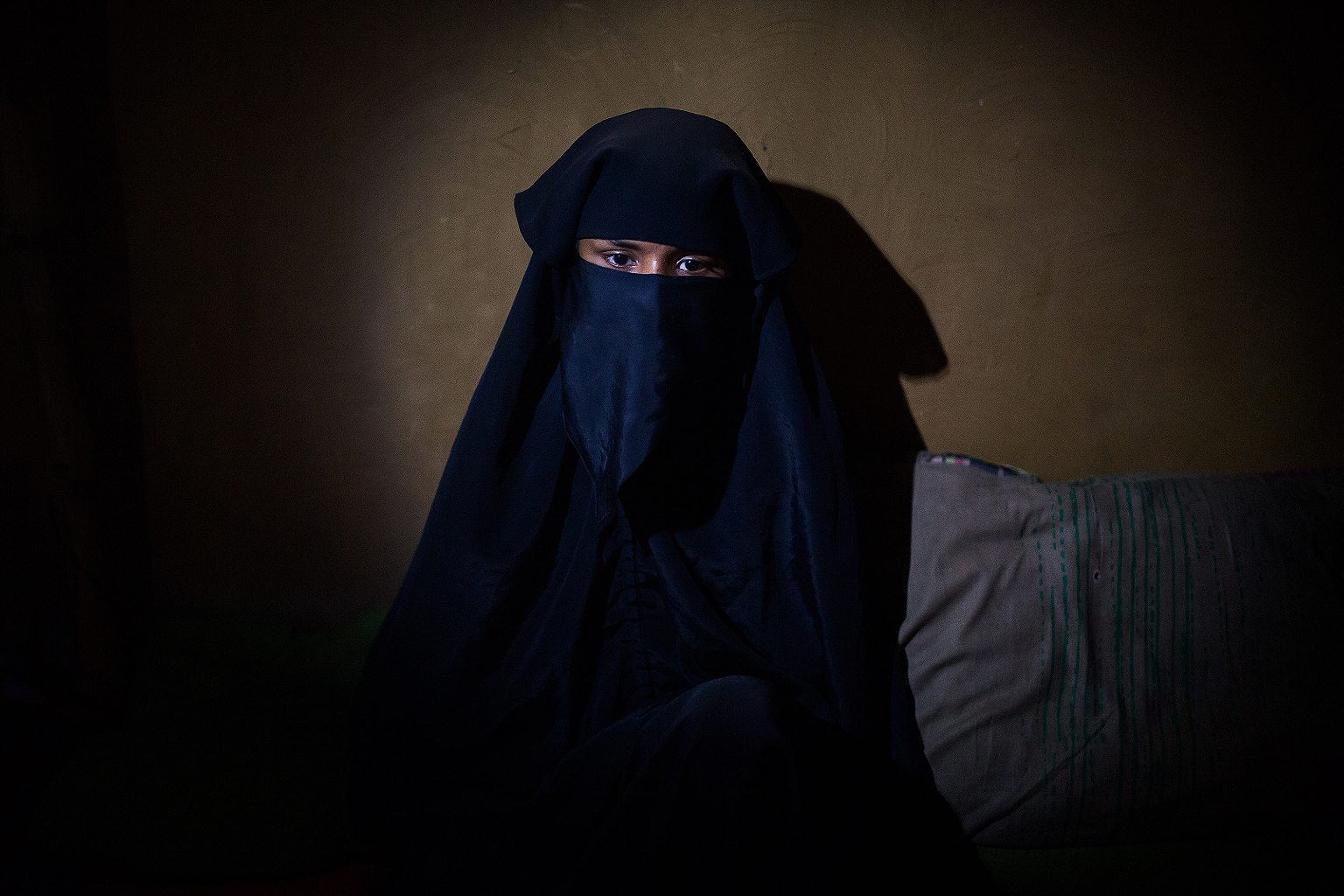
Although they might have brought the profession with her to the camps, Begum tells me that she was dealing drugs for the same reasons as Khatun. Both in Myanmar and Bangladesh, she says, there is no opportunity for work. The Rohingya are so profoundly marginalized that she was left with “no choice but smuggle” to feed her family.
Walking through the camps, it isn’t difficult to imagine how someone like Khatun or Begum would be forced to put their lives at risk. At the top of the hill at the Balukhali refugee camp, hundreds of squat shacks slouch like wet tea bags on the slopes. Thick grey smog rises from the many cooking-fires burning inside the huts in the camp. And along each of the little alleys that divide the shacks are gutters of sewage, filled with noxious veins of fetid food, larvae, feces and lumpy water.
“During the monsoon season we had to wade through all that muck,” one of the refugees tells me, pointing at the open drains.
[Related: Here’s what the Rohingya want the Burmese government to know]
There are many other problems in the camps. For one, there isn’t enough water to supply all the refugees, and much of the water there is for the refugees is contaminated with E. Coli. Open sewers and a lack of toilets have led to the spread of cholera and diphtheria. Children are most at risk.
Khatun’s hut, fashioned from bamboo sticks and tarpaulin, is among the thousands that crammed onto the surrounding hillocks; a raw sprawl of discontent from which the Rohingya cannot escape. The refugees here are not allowed to find work in local businesses or marry into the local population. In some cases, they have even been denied the right to take out a phone contract. They are free from their oppressors in Myanmar but are now forced to live rough amid the implacable heat, monsoon rains, diseases, and monotony of the camps.
Khatun has lived this reality for 20 years. She had relied on aid from various NGOs and the odd jobs that her husband could scrape together. However, when he died a few years ago, she was left with nothing. That’s when a supplier approached her and asked if she would be interested in smuggling yaba. She had little choice.
“The possibility of getting caught is far less grave than the reality of letting my family suffer or die here,” Khatun says.
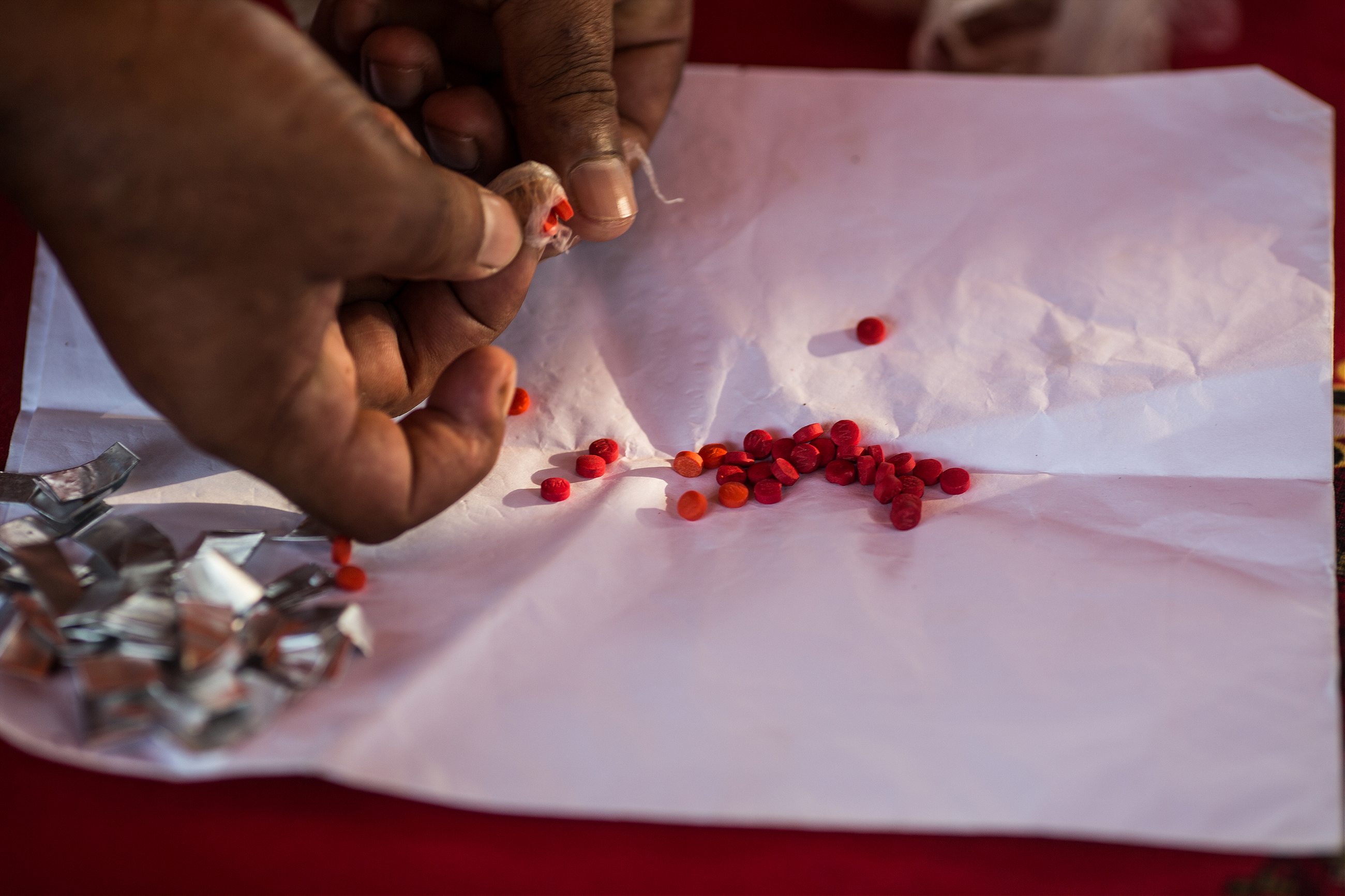
Yaba, which means “crazy pill” in Thai, is produced in the isolated labs hidden inside the hills of the eastern Shan state in Myanmar. Once mostly found on the streets and nightclubs of Thailand and neighboring Laos, the drug, which comes in different strengths, has become popular in Bangladesh in recent years. The most popular variant here, called the Champa pill, comes in red and costs between 150-300 taka (approx. $1.50-$3.50) in Dhaka. Then there is the R7, slightly better quality and normally green, which can cost upwards of 700 taka (about $8).
The scale of the yaba business in Myanmar is difficult to quantify. Unlike heroin, which is geographically specific, meaning that it can only be produced in certain places, methamphetamines like yaba can be made anywhere. “We don’t know how big this industry is, just that it is big,” says Colonel Zaw Lin Tun, a senior officer Myanmar police, who spoke to me from Myanmar by phone. “The drug is being found everywhere and in different-sized labs, with different-sized outputs and manufacturing techniques.”
The manufacturing process is relatively well-known: locals gangs in Shan buy chemicals for meth production from suppliers in China and India and prepare them in small-to-large-scale laboratories throughout the state. The yaba formula is mixed on-site—sometimes it’s taken to a different lab elsewhere—and then transported to factories where the gangs use manual or motorized presses to turn the powders into tablets.
The drug, which is consumed in pill form or smoked on tin foil through a straw, is known to produce intense bursts of energy, decreased appetite and a sense of euphoria after consumption. Once the effects of these pills wear off, users report lengthy periods of exhaustion and depression. Long-term use could provoke psychiatric disorders, according to United Nations Office on Drugs and Crime, making the addict aggressive and prone to violent outbursts.
In 2013, a teenage girl murdered her parents at their home in Dhaka after they had discovered her addiction to yaba habit and confined her to the house. In a fit of rage, the girl had mixed their coffees with a strong sedative, then stabbed them to death while they were unconscious. The incident shocked the country.
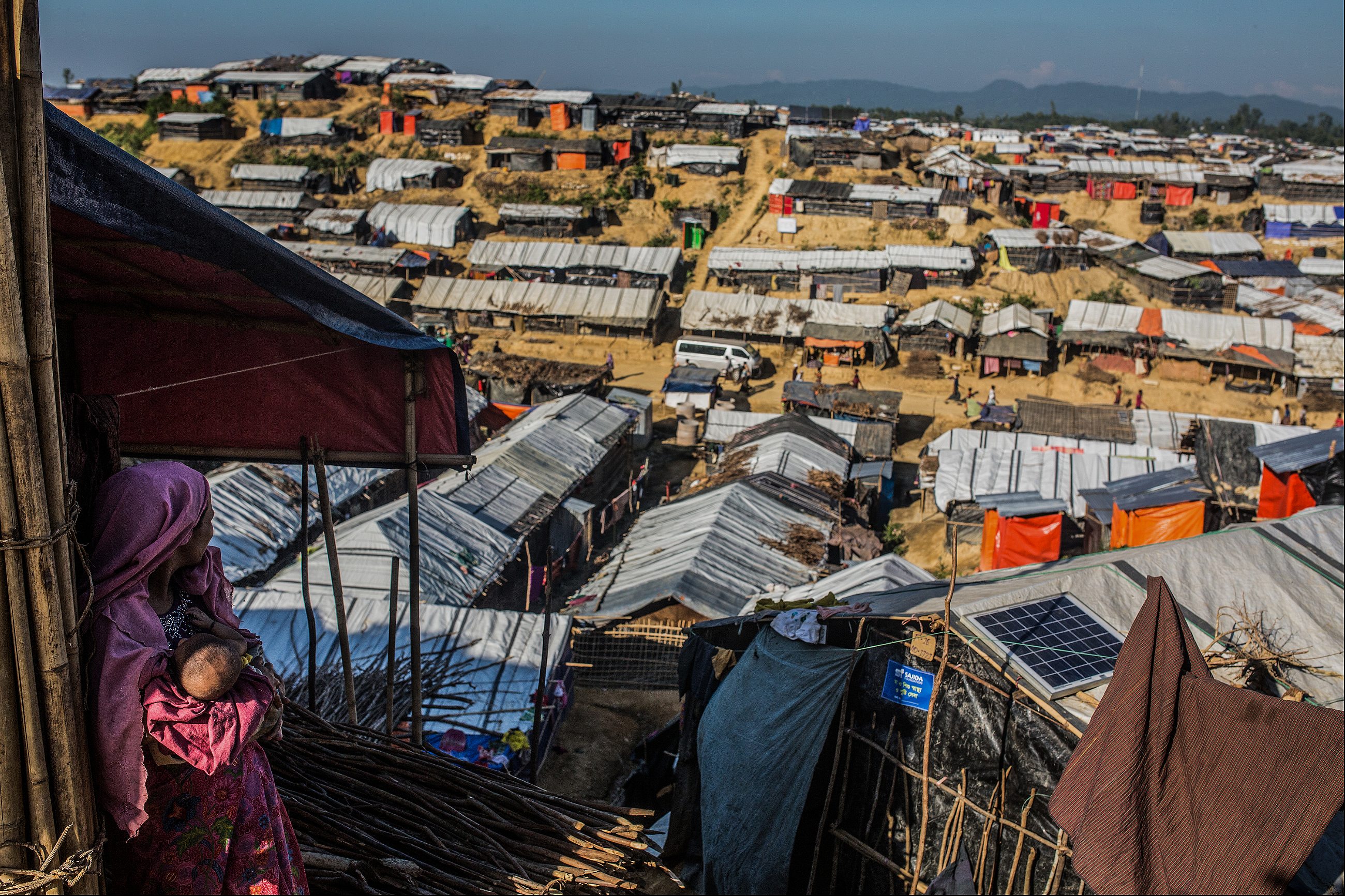
About 40 minutes from the camp in Cox’s Bazar, Rashed Didarul runs NONGOR, a non-profit rehabilitation center for yaba addicts. Patients here, all of whom are men, are subjected to ninety days of abstinence from drugs and taught a set of guiding principles to help them recover from addiction, similar to the 12-step program made famous by Alcoholics Anonymous.
The facilities at NONGOR are basic: a series of austere rooms with whitewashed walls, wrought-iron beds, and plastic chamber pots. There are barred, prison-style gates to stop the men from escaping. In a small room, about 90 men sit on plastic chairs organized in rows. They are listening to a talk delivered in solemn tones by one of the workers. It has the air of a somber religious ceremony, as men stare at the speaker with their sunken eyes, their skin taut against their skulls. Many of them tremble feverishly. It is hot, and the air smells faintly of disinfectant and vomit.
After the talk finishes, I meet Mamun, a 30-year old Burmese-Bangladeshi from Teknaf, a town about an hour and a half south of Cox’s Bazar on the Burmese border. Mamum, who asked to be identified only by his first name because he feared getting arrested, had been taking over 100 yaba pills a day, he had come to the center to save his life. But he had also come to Didarul to take a break from his trade. Mamum was also a drug-trafficker, the type who had been paying women like Begum and Khatun to become mules and transport yaba across the border to Bangladesh.
Mamum tells me he has been dealing drugs in the Teknaf area for the last six years. On a trip to Myanmar, an uncle who lived in the western town of Maungdaw in Rakhine state—home to the Rohingya—told him he could help him make money in the yaba business. All he would have to do was collect drugs at the border, smuggle them to Cox’s Bazar and sell them to other Bangladeshi wholesalers.
Mamun agreed to his uncle’s proposal, and once a week, he and a group of trusted associates would drive to the clandestine points across the border. There, the men would collect their shipment of pills from local fishermen, whom they paid 10,000-12,000 taka ($145) per run. These boatmen would hide the pills in onions, watermelons, or in plastic bags that they sunk underwater and attached to the gunwale of their boats. Every week, Mamum received up to 60,000 tablets, which he purchased for between 25 and 45 taka (up to 50 cents) per pill, depending on their quality.
In recent years, Mamun’s job has gotten easier as violence escalated across the border. As the number of Rohingya fleeing from Rakhine increased, so did the number of potential mules, who could carry yaba for Mamum. “Using Rohingya was cheaper, less risky, and far more difficult for the authorities to connect the drug smuggling back to me,” he says.
“Our biggest weapon as smugglers are the camps themselves.”
The Rohingya who are desperate to cross into Bangladesh agree to smuggle the drugs in return for safe passage, or for meager sums of money. The mules change on each trip, but the routine doesn’t. The men go to the border, and along with local fisherman, they also pick up their drugs from fleeing refugees who hide the drugs among their belongings. It’s the perfect disguise—thousands of people coming over the border at once makes it impossible for authorities to track who or what is crossing with them.
Even as the exodus has slowed down in recent months, Mamum says that dealers have been able to persuade many refugees to go back and forth across the border for more.
When I ask Mamum to describe how he got the drugs from the border to Cox’s Bazar, his response was less enthusiastic. Didarul, NONGOR’s director, suspects it was because he, or his family, was still involved in smuggling yaba.
Abdul Gafur, a 19-year-old yaba dealer who had been listening in to our conversation, is more ready to spill his secrets. He tells me he had arrived at rehab after a fight with his mother, who was upset after finding out about his yaba addiction. Gafur is gaunt, his eyes bulging from sunken sockets, and he often drifts off while we speak. He says he is desperate for another hit.
Gafur says many drug dealers, himself included, use refugees like Khatun and Begum to get the drugs from the border to the camps and then into Cox’s Bazar. He said he favors female smugglers for two reasons. One, because if they are single and desperate for work like Khatun, they are easier to manipulate; and, two, because women are less likely to be checked than men. Bangladesh is a conservative Muslim country, where a female officer has to be present to arrest women.
Khatun’s stories confirm Gafur’s assertions. Her supplier had often instructed her to exploit the fact she is a woman. He recommended she bring her baby along with her on the drug runs. He said it made her seem innocent, less suspicious.
“But perhaps our biggest weapon as smugglers are the camps themselves,” Gafur brags.
“They are labyrinthine and so overpopulated that things were almost impossible to trace.” Moreover, the government has imposed a curfew of 7 p.m. for all Bangladeshi officials. “There was no one there to police anything during the nighttime,” he says, which makes the refugee camp the perfect place to hide the consignments.
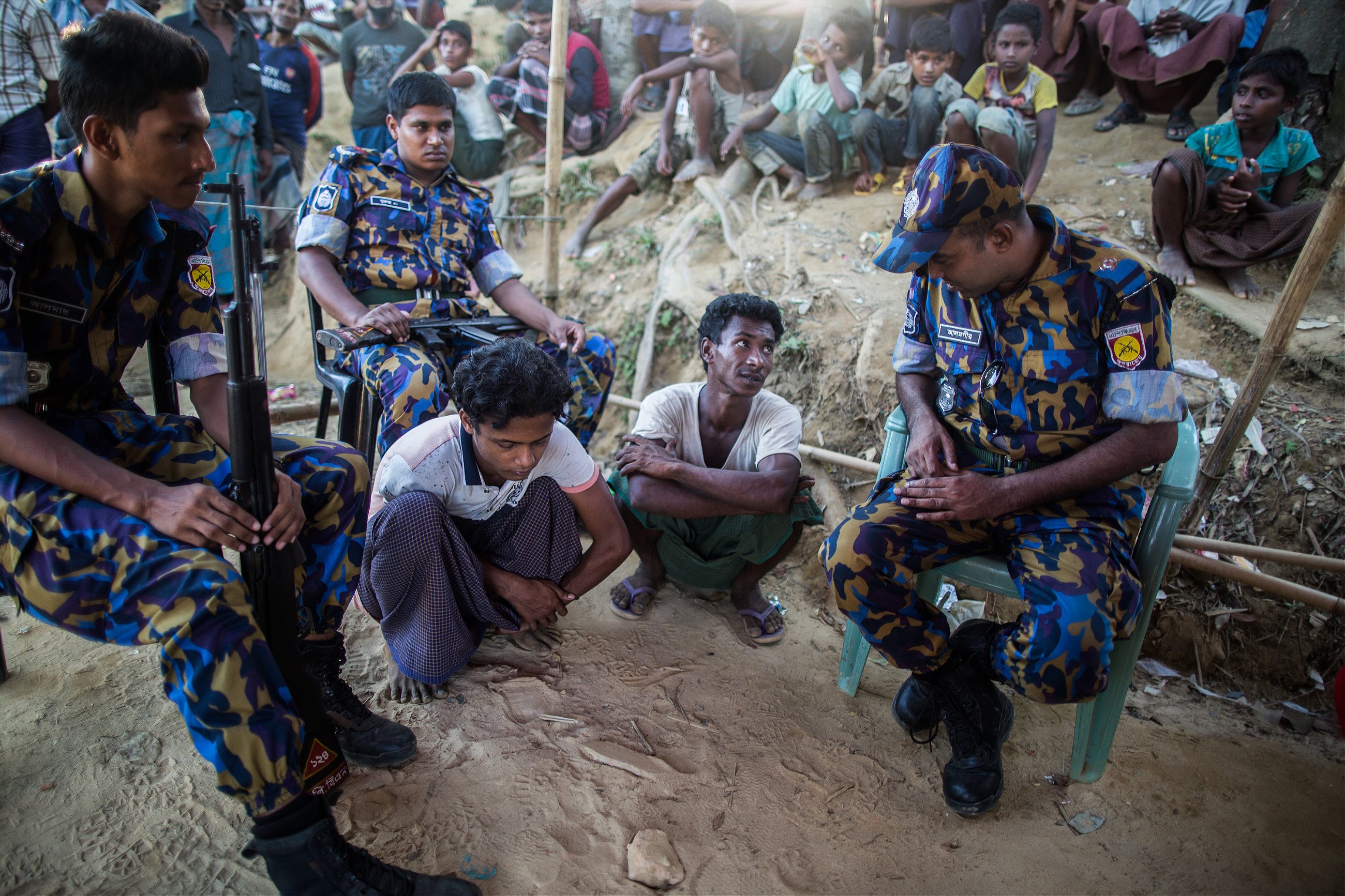
It’s a hot afternoon in November, and I am sitting under the shade of a large tent in Balukhali 1, a makeshift refugee camp, not far from Khatun’s home. A sultry breeze brings with it the noxious sweetness of sweat from a group of soldiers patrolling in their polyester uniforms. Sohel Rana, a high-ranking civil servant in the Bangladeshi government, stands next to a large wooden table, covered by a blood-red cloth and messy piles of documents. In front of him, thousands of Rohingya refugees, queuing in long sinuous lines in front of the table, wait for bags of rice under the beating sun. Old men buckle under the weight of the cumbersome sacks, withered children scratch and wince at their blistered skin, and pregnant women rock back and forth like boats in the choppy water.
Rana, 30, had been transferred here from the Feni district in eastern Bangladesh, where he worked as an executive magistrate. For the past month, he has been posted, like all the other high-ranking civil servants, in one of the 23 makeshift Rohingya camps in the area. He is responsible for rationing of food, collaborating with NGOs—and overseeing law and order.
Rana is aware of the scale of the yaba problem. He has already conducted eight drug busts during his month in the camps. Rana and his fellow magistrates across the region know how Bangladeshi and Burmese drug gangs take advantage of the Rohingya, particularly women like Begum and Khatun, to transport their drugs. Last year, a month after the latest exodus from Myanmar began, the Bangladesh Border Guard arrested three young Rohingya men for attempting to smuggle 20,000 pills across the border.
On the morning I am with him, Rana is waiting for a call. His men had informed him that two Rohingya refugees were smuggling large quantities of yaba into the Balukhali camp. They could have been could in charge of a group of mules like Begum or Khatun, or it was possible they were local dealers. Either way, secret police had information that they had stashed at least 2000 pills in their hideout.
Rana had already sent two undercover agents and a Rohingya informant to investigate. He was laying a trap. First, his agents would locate the house. Then the mole, disguised a client, would purchase the yaba. Then Rana would soon swoop in to make the arrest. Until then, he can do little but stare at his phone.
The young magistrate isn’t nervous. He’s been in situations like these many times before. Several months earlier, he had received a letter of commendation from his superiors for his bravery. Rana had been working as an executive magistrate in the Feni district, combating drug trafficking on the eastern Indian-Bangladeshi border, when on March 8, 2017, one of his informants drove the magistrate to a small village. It turns out that the informant was working as a double agent for the local drug lords. And the trip to the village was an ambush: 150 men—wielding axes, crowbars, and knives—were waiting to kill him. A junior officer had his throat sliced by a villager, and as Rana tried to intervene, he was stabbed three times: twice in the arm and once in the back.
Scrambling back to his car, the magistrate ordered his men to fire their guns to scare off the crowd. The mob dispersed, but not before it grabbed the informant, and dragged the dead officer’s body across the border into Indian territory. In the days that followed the raid, Rana would manage to have the officer’s body returned to Bangladesh. The mole, however, remained on the Indian side.
Back in Balukhali 1, Rana’s phone vibrates noisily on the thick tablecloth.
Rana takes the call and nods slowly, walking away from the desk and toward a group of 10 soldiers holding assault rifles. Without saying a word, he then walks towards a white van, motioning us to follow.
Fifteen minutes later, outside a mud-brick house, tucked away in a small ravine, the two undercover officers drag two young men kicking and squirming out of a low-hanging doorway, by the knots of their longyis. As they are shoved into the house’s small backyard, Rana charges through the door, followed by the armed officers.
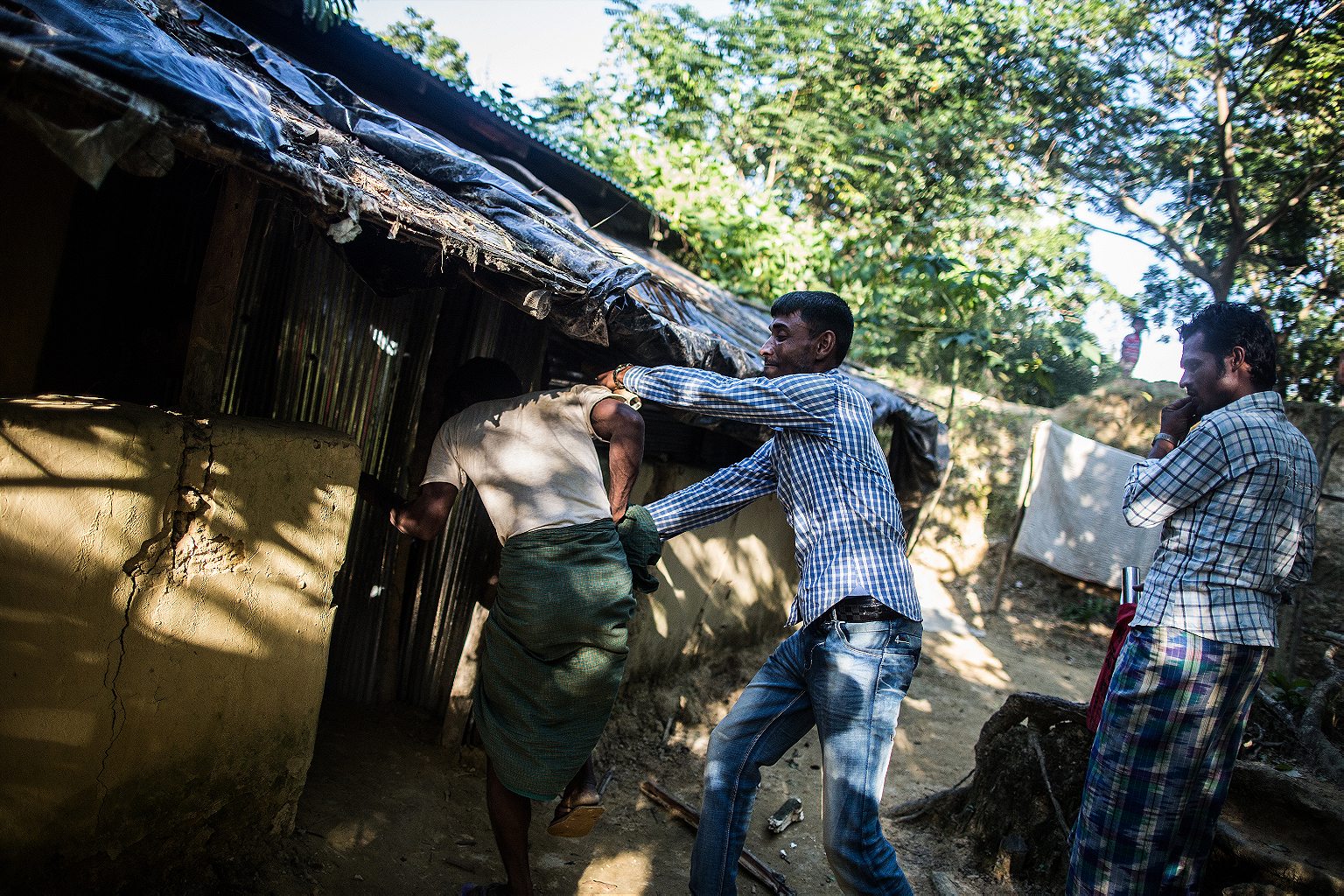
There are thumps, thuds, and cracks. A young woman screams, three chickens explode through the doorway in a frenzy of feathers and clucks, and a small goat ambles sleepily from the house’s side entrance. Then, I watch as the young magistrate emerges with a cigarette packet containing a small plastic bag. Inside the bag are about 45 bright red pills that smell strongly of vanilla.
“There has to be more of these around; I was told 2000,” Rana shouts at his men. “Come on, come on, check!”
The police continue to search the house and the thatch of the roof, while the men, guarded by three armed officers, watch passively. One of the men’s hands is stained bright red by the yaba’s dye. The other one, who seems much older than his partner, is short and sinewy, with veins that bulge from the skin like electric cables.
“They’ll go to prison for up to six months for this unless they give the details of who is hiding the rest of the drugs,” Rana says, counting the pills.
Around us, some 200 other refugees have gathered in a semicircle around the house. They wince as the soldiers push and scold the young men. Some shout insults.
“One of them knows something,” Rana says, motioning to the crowd. “But, they’ll never say, and we don’t have the equipment to search the whole area properly.”
Rana knows that his resources are limited. He knows that there are too many people, too many hiding places and too many other problems for him to dedicate time to hunt down the rest of the stash. He is understaffed and under-resourced. But to Rana, the operation is successful because he believes it had sent a message—a message that people will be punished if they participated in the yaba trade. The smugglers may be the bottom rung on a very tall ladder, but for Rana, the fight against yaba has to start somewhere.
But the magistrate’s considerable efforts to police his camp contrast with tales of corruption and negligence elsewhere.
At the rehabilitation center near Cox’s Bazar, Abdul Gafur, the 19-year-old yaba dealer, had told me that most dealers paid massive bribes to create safe passage for their mules. He spent up to $120 a week on bribes to the police. “A lot of the authorities around here are not only not preventing the crime, but they are also part of it,” Gafur said. Both Khatun and Begum also admitted that their contacts had paid off the local police. If they ever found themselves in trouble, they told their contacts would get them out of it.
“We are well aware that both the authorities in our own country and in Myanmar are involved in the trade.”
But Gafur says the relationship ran deeper than that even. A few years before, when he was regularly using yaba, he was caught buying drugs during a police raid in Teknaf. Instead of sending him to prison, the police turned him into an informant, and Gafur says he spent the next few years ratting out other yaba dealers and Rohingya mules in the area. In return for his services, he claimed the police gave him 30 percent of every seizure that was seized based on his information.
“The police would seize a consignment of 10,000 pills. When they get to the police station, they would declare that they only found 5,000 pills. They then would give 3,000 to me, and keep 2,000 for themselves to sell on later.”
Bangladeshi officials I spoke to are not surprised by Gafur’s story. “We are well aware that both the authorities in our own country and in Myanmar are involved in the trade,” a high ranking civil in the Bangladesh government who spoke on condition of anonymity because he was not authorized to discuss internal matters, tells me. The wages of police officers and border guards are low, less than $25 a week, and the offers from yaba dealers so lucrative, they said, that many had been lured into looking the other way.
Last September, the country’s national police started an investigation into several officers linked to the Cox’s Bazar constabulary. According to local newspaper reports the implicated officers had failed to declare 722,000 yaba pills, which, it was estimated, they had then sold for $950,000.
“Unfortunately, these things are common in our country,” the senior official tells me. “This won’t be the last time it happens.”
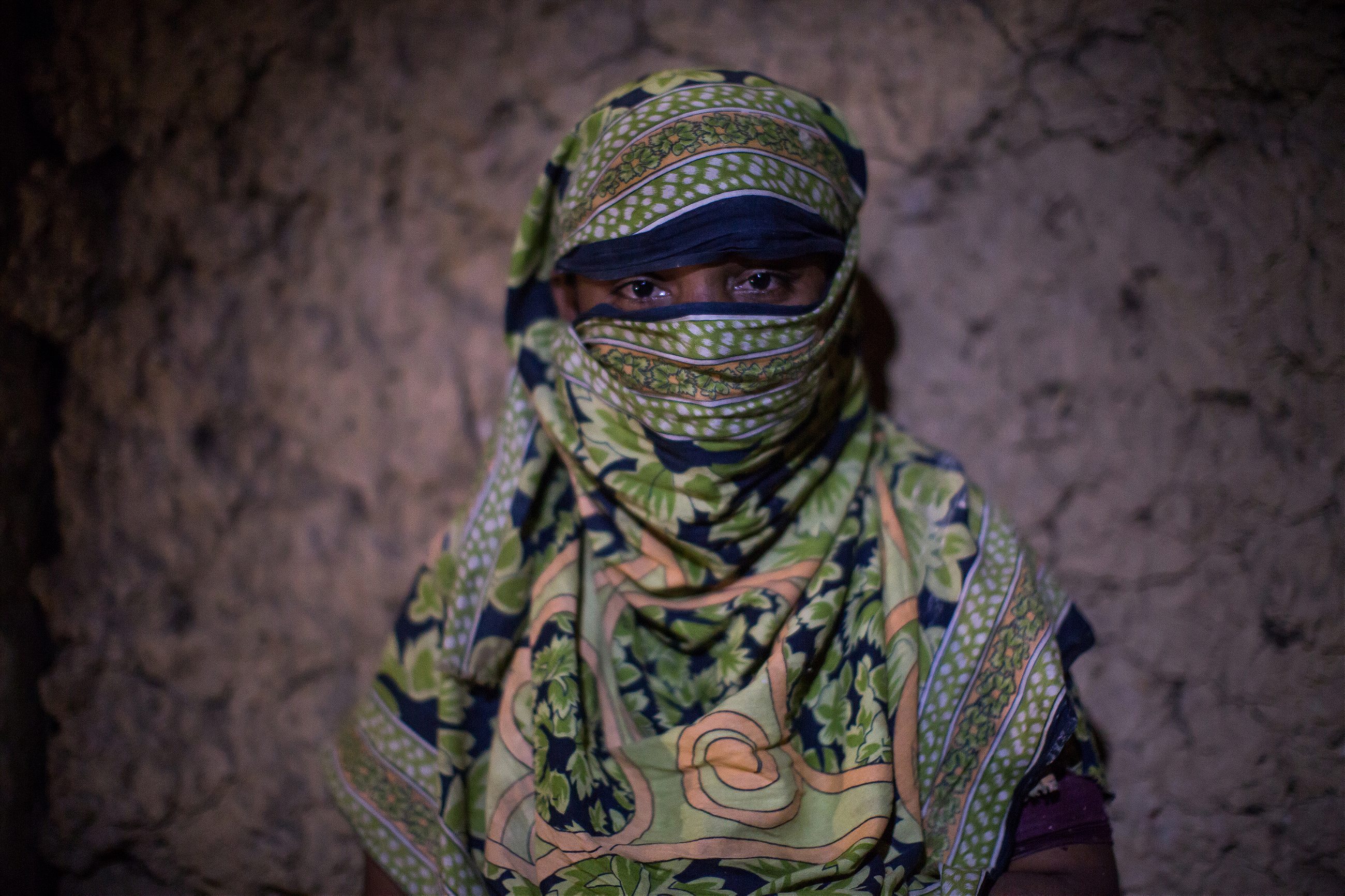
During one of her regular drugs runs to Cox’s Bazar last fall, Khatun’s bus was stopped at a police checkpoint. Officers boarded and began asking passengers for their documentation. Khatun, of course, had no papers, and as the police made their way to the back of the coach, she panicked and burst into tears. When an officer reached her, she told them that her baby was gravely ill and that she had to take him to hospital. If they didn’t let her pass, he would surely die.
She was lucky that day—the police believed her story, but she knew her good fortune wasn’t infinite.
Khatun was thinking about this as she got off the bus and started walking home to the camps. On a muddy lane, near her house, which meandered up and around one of the area’s hills, refugees were carrying large white rice bags from aid trucks back to their homes. Children set up empty Coke bottles as pins and use round pebbles as bowling balls. Men and women sat in front of their homes chewing on betel nuts, and watching the procession of rice bags with dead-eyed stares.
There are so many things to worry about at the camp: if she will be sent back home to Myanmar, if she will ever get Bangladeshi citizenship, or, indeed, if she will get caught by the police. But Khatun doesn’t have the luxury of thinking about these things too much. She needs to focus on surviving. “Most weeks,” she says, “I get on that bus whether I like it or not.”